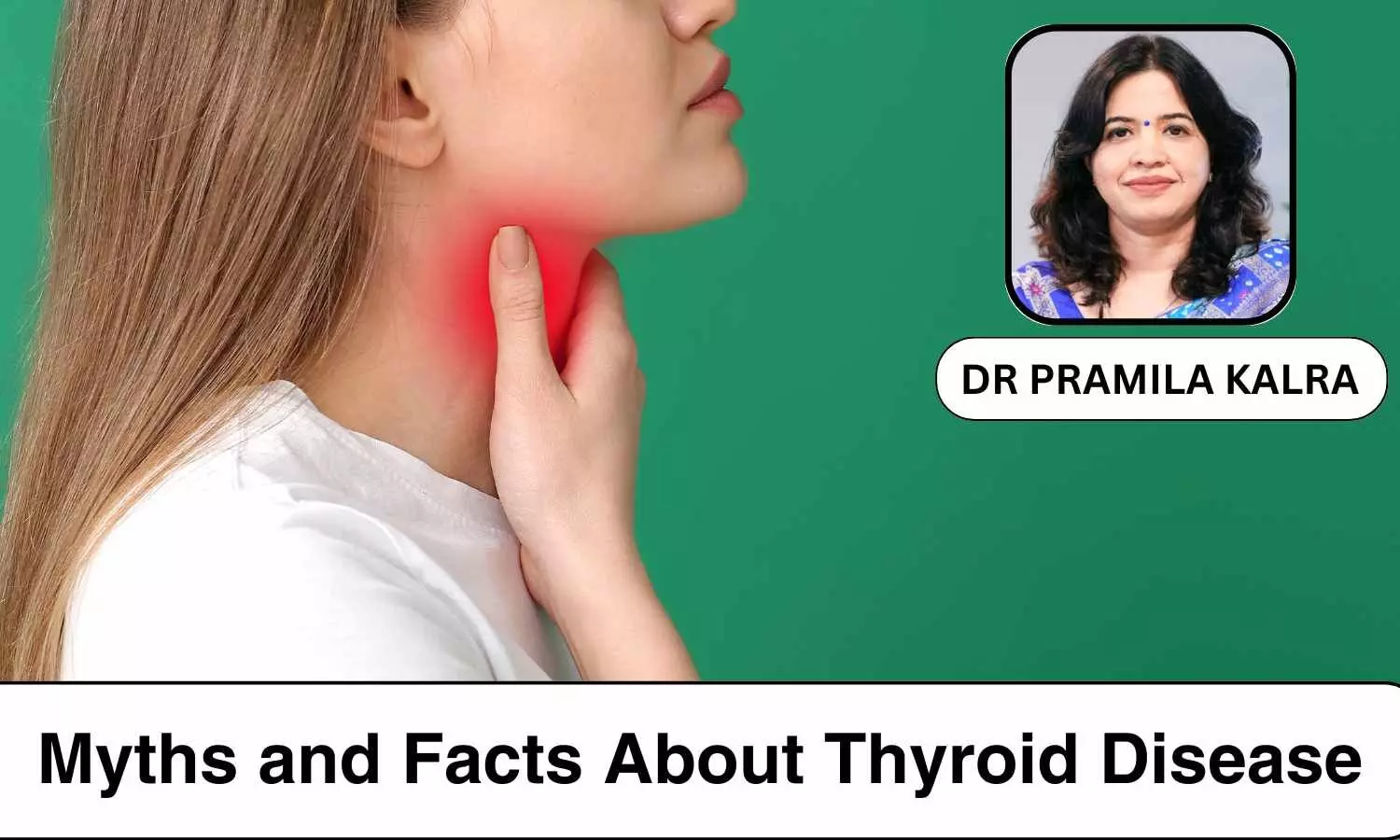9 Common Myths and Facts About Thyroid Disease - Dr Pramila Kalra

Thyroid disease affects millions of people worldwide, yet it remains covered in misconceptions and misinformation. From misunderstandings about who can develop thyroid issues to confusion about symptoms and treatment options, these myths can hinder proper diagnosis and management.
Myth 1: If you have thyroid disease, you will have visible symptoms.
Fact: Thyroid disease can present with a wide range of symptoms, but they are often subtle and easily mistaken for other conditions.
For example, symptoms like fatigue, weight gain, and depression are common to many illnesses and can lead to a delayed diagnosis.
Some people with thyroid disease will not have symptoms at all, particularly in the early stages. Regular screening and awareness of family history are essential for early detection.
Myth 2: If you have thyroid, your eyes will bulge.
Fact: This is not always true. Eye bulging is typically associated with Graves’ disease, the most common form of hyperthyroidism.
Other eye issues linked to Graves’ disease include double vision, dry eyes, and swollen eyelids. To reduce the risk of developing Graves’ disease, avoid smoking, as it can increase the likelihood of this condition.
Myth 3: If you have a thyroid nodule, it must be cancerous.
Fact: Developing a thyroid nodule does not necessarily mean it is cancerous. Most of these nodules are benign and harmless.
Those thyroid swellings with suspicious features on ultrasound have a higher risk of malignancy, hence ultrasound is an important modality of investigation for the same.
Myth 4: Only older people get thyroid disease.
Fact: Thyroid disease can affect individuals of any age, including infants, teenagers, and young adults.
Congenital hypothyroidism, for example, is present at birth and can lead to severe developmental issues if not treated promptly.
Graves' disease, an autoimmune form of hyperthyroidism, often affects women in their 20s and 30s. Regular monitoring and awareness are essential across all age groups.
Myth 5: It is impossible to lose weight with hypothyroidism.
Fact: While losing weight can be challenging, especially in your late 30s and early 40s due to the reduce in metabolism rate, it is not impossible for those with hypothyroidism.
These weight loss challenges are similar for people undergoing proper thyroid treatment and for those without thyroid issues. With appropriate management and a healthy lifestyle, weight loss is achievable for individuals with hypothyroidism.
Myth 6: Thyroid medications cannot be taken during pregnancy.
Fact: This is not true. Without treatment, thyroid disorders can lead to serious complications during pregnancy, such as miscarriage, preeclampsia, preterm delivery, and developmental issues in the foetus.
Women should continue to take appropriate and pregnancy-safe thyroid medications under the guidance of their doctors to ensure both their health and the health of their baby.
Myth 7: People with a thyroid condition will be on medication for life.
Fact: It depends on the cause of the condition. Some women develop thyroid problems during or after pregnancy. Once the body’s hormones level change, the thyroid could correct itself. It’s also true that prescriptions can change throughout the lifespan.
For example, people with an underactive thyroid might need more supplemental thyroid hormone during pregnancy.
Myth 8: Thyroid disorders only affect women.
Fact: While it is true that women are more likely to develop thyroid disease, men are not immune.
According to the American Thyroid Association, women are five to eight times more likely than men to have thyroid problems.
However, millions of men suffer from thyroid disease, and they are often underdiagnosed because of this prevailing myth.
Myth 9: Natural supplements can cure thyroid disease.
Fact: While some natural supplements can support thyroid health, they are not a cure for thyroid disease. It is important to approach such claims with skepticism and consult doctors before starting any supplement.
Effective management of thyroid disease typically involves medications prescribed by a doctor, and self-treatment can be dangerous and ineffective.
Understanding the truths behind thyroid disease is crucial for accurate diagnosis and effective management. Dispelling common myths helps to ensure that people receive proper care and treatment.
By raising awareness and promoting regular medical check-ups, thyroid health can be better addressed, enhancing the quality of life for those affected by this condition.
Disclaimer: The views expressed in this article are of the author and not of Medical Dialogues. The Editorial/Content team of Medical Dialogues has not contributed to the writing/editing/packaging of this article.


